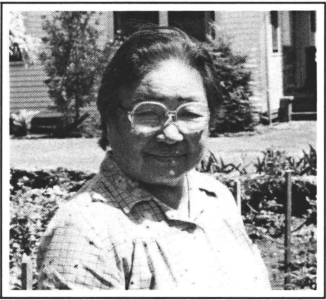Masako Hanzawa Sugawa

Koloa: An Oral History of a Kauai Community
In 1984, members of the Friends of Koloa Public/School Library began researching their community's history for a commemorative publication, marking the sesquicentennial of commercial sugar cultivation in Hawaii.
Masako Sugawa, eldest of three children, was born in 1911, in Halehaka, Kaua'i. Her father, Yoichiro Hanzawa, immigrant from Miyagi-ken, Japan, was a rice farmer in Halehaka; her mother, Kesa, also from Miyagi-ken, died at age thirty-three in 1919. Masako helped her father care for her sister and brother. At age fourteen, Masako and the family moved to Puhi where her father found employment as a carpenter for Grove Farm. At age eighteen, Masako married Tokuichi Sugawa and moved to Lawa'i. When her son began attending school, ca. 1934, the family moved to Koloa. Both Masako and her husband were employed as operators by the local telephone company. He retired in 1960; she retired six years later. Often called, The Rose Lady of Koloa, Masako can be found gardening or reading at home. She has a son on Kaua'i, a daughter on O'ahu .
Scope and Content Note
Raised by her widower father, a Japanese woman recalls rice paddies in Niumalu, childhood play and work, marriage, Koloa town, World War II and the influx of soldiers, telephone exchange work, Hurricanes Dot and Iwa, and her rose garden.
Program Note:
This interview is part of the Center for Oral History's project Koloa: An Oral History of a Kauai Community. Interviews from this project are available in the Center's ScholarSpace open access repository.
The Center for Oral History (COH), in the Department of Ethnic Studies at the University of Hawaiʻi at Mānoa, collects, documents, preserves and highlights the recollections of Native Hawaiians and the multi-ethnic people of Hawaiʻi. It produces oral histories and interpretive historical materials about lifeways, key historic events, social movements and Hawaiʻi’s role in the globalizing world, for the widest possible use.
Please Note: The oral histories in this collection are protected by copyright and have been created for educational, research and personal use as described by the Fair Use Doctrine in the U.S. Copyright law. Please reach out Voices@noaa.gov to let us know how these interviews are being used in your research, project, exhibit, etc. The Voices staff can help provide other useful resources related to your inquiry.
The NOAA mission is to understand and predict changes in climate, weather, oceans, and coasts, to share that knowledge and information with others, and to conserve and manage coastal and marine ecosystems and resources. The Voices Oral History Archives offers public access to a wide range of accounts, including historical materials that are products of their particular times, and may contain offensive language or negative stereotypes.
Voices Oral History Archives does not verify the accuracy of materials submitted to us. The opinions expressed in the interviews are those of the interviewee only. The interviews here have been made available to the public only after the interviewer has confirmed that they have obtained consent.
